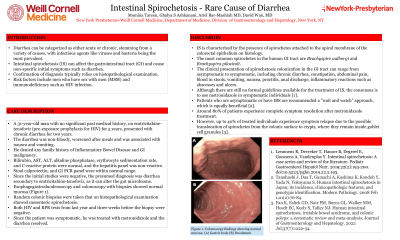Sunday Poster Session
Category: Small Intestine
P1596 - Intestinal Spirochetosis - Rare Cause of Diarrhea
Sunday, October 27, 2024
3:30 PM - 7:00 PM ET
Location: Exhibit Hall E

Has Audio

Momina Tareen
Cornell University
New York, NY
Presenting Author(s)
Momina Tareen, 1, Ghalya Ashkanani, 1, Ariel Bar-Mashiah, MD2, David Wan, MD3
1Cornell University, New York, NY; 2New York-Presbyterian Hospital/Weill Cornell Medical Center, New York, NY; 3New York-Presbyterian / Weill Cornell Medical Center, New York, NY
Introduction: Diarrhea can be categorized as either acute or chronic, stemming from a variety of causes, with infectious agents like viruses and bacteria being the most prevalent. Rarely, intestinal spirochetosis (IS) can affect the gastrointestinal tract (GI) and cause non-specific initial symptoms such as diarrhea. Confirmation of diagnosis typically relies on histopathological examination. Risk factors include men who have sex with men (MSM) and immunodeficiency such as HIV infection.
Case Description/Methods: A 31-year-old man with no significant past medical history, on emtricitabine-tenofovir (pre-exposure prophylaxis for HIV) for 5 years, presented with chronic diarrhea for two years. The diarrhea was non-bloody, worsened after meals and was associated with nausea and vomiting. He denied any family history of Inflammatory Bowel Disease and GI malignancy. Bilirubin, AST, ALT, alkaline phosphatase, erythrocyte sedimentation rate, and C-reactive protein were normal, and the hepatitis panel was non-reactive. Stool calprotectin, and GI PCR panel were within normal range. Since the initial studies were negative, the presumed diagnosis was diarrhea secondary to emtricitabine-tenofovir, as it can alter the gut microbiome. Esophagogastroduodenoscopy and colonoscopy with biopsies showed normal mucosa. Random colonic biopsies were taken that on histopathological examination showed mesenteric spirochetosis. Both HIV and RPR tests from last year and three weeks before the biopsy were negative. Since the patient was symptomatic, he was treated with metronidazole and the diarrhea resolved.
Discussion: IS is characterized by the presence of spirochetes attached to the apical membrane of the colorectal epithelium on histology. The most common spirochetes in the human GI tract are Brachyspire aalborgi and Brachyspira pilosicoli. The clinical presentation of spirochetosis colonization in the GI tract can range from asymptomatic to symptomatic, including chronic diarrhea, constipation, abdominal pain, blood in stools, vomiting, nausea, proctitis, anal discharge, inflammatory reactions such as abscesses and ulcers. Although there are still no formal guidelines available for the treatment of IS, the consensus is to use metronidazole in symptomatic individuals. However, up to 20% of treated individuals either do not improve or relapse due to the possible translocation of spirochetes from the colonic surface to crypts, where they remain inside the goblet cell granules.
Disclosures:
Momina Tareen, 1, Ghalya Ashkanani, 1, Ariel Bar-Mashiah, MD2, David Wan, MD3. P1596 - Intestinal Spirochetosis - Rare Cause of Diarrhea, ACG 2024 Annual Scientific Meeting Abstracts. Philadelphia, PA: American College of Gastroenterology.
1Cornell University, New York, NY; 2New York-Presbyterian Hospital/Weill Cornell Medical Center, New York, NY; 3New York-Presbyterian / Weill Cornell Medical Center, New York, NY
Introduction: Diarrhea can be categorized as either acute or chronic, stemming from a variety of causes, with infectious agents like viruses and bacteria being the most prevalent. Rarely, intestinal spirochetosis (IS) can affect the gastrointestinal tract (GI) and cause non-specific initial symptoms such as diarrhea. Confirmation of diagnosis typically relies on histopathological examination. Risk factors include men who have sex with men (MSM) and immunodeficiency such as HIV infection.
Case Description/Methods: A 31-year-old man with no significant past medical history, on emtricitabine-tenofovir (pre-exposure prophylaxis for HIV) for 5 years, presented with chronic diarrhea for two years. The diarrhea was non-bloody, worsened after meals and was associated with nausea and vomiting. He denied any family history of Inflammatory Bowel Disease and GI malignancy. Bilirubin, AST, ALT, alkaline phosphatase, erythrocyte sedimentation rate, and C-reactive protein were normal, and the hepatitis panel was non-reactive. Stool calprotectin, and GI PCR panel were within normal range. Since the initial studies were negative, the presumed diagnosis was diarrhea secondary to emtricitabine-tenofovir, as it can alter the gut microbiome. Esophagogastroduodenoscopy and colonoscopy with biopsies showed normal mucosa. Random colonic biopsies were taken that on histopathological examination showed mesenteric spirochetosis. Both HIV and RPR tests from last year and three weeks before the biopsy were negative. Since the patient was symptomatic, he was treated with metronidazole and the diarrhea resolved.
Discussion: IS is characterized by the presence of spirochetes attached to the apical membrane of the colorectal epithelium on histology. The most common spirochetes in the human GI tract are Brachyspire aalborgi and Brachyspira pilosicoli. The clinical presentation of spirochetosis colonization in the GI tract can range from asymptomatic to symptomatic, including chronic diarrhea, constipation, abdominal pain, blood in stools, vomiting, nausea, proctitis, anal discharge, inflammatory reactions such as abscesses and ulcers. Although there are still no formal guidelines available for the treatment of IS, the consensus is to use metronidazole in symptomatic individuals. However, up to 20% of treated individuals either do not improve or relapse due to the possible translocation of spirochetes from the colonic surface to crypts, where they remain inside the goblet cell granules.
Disclosures:
Momina Tareen indicated no relevant financial relationships.
Ghalya Ashkanani indicated no relevant financial relationships.
Ariel Bar-Mashiah indicated no relevant financial relationships.
David Wan indicated no relevant financial relationships.
Momina Tareen, 1, Ghalya Ashkanani, 1, Ariel Bar-Mashiah, MD2, David Wan, MD3. P1596 - Intestinal Spirochetosis - Rare Cause of Diarrhea, ACG 2024 Annual Scientific Meeting Abstracts. Philadelphia, PA: American College of Gastroenterology.
